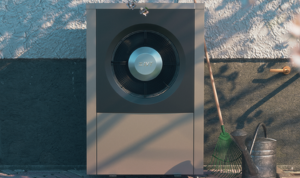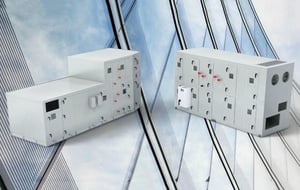From Complexity to Configurabillity
Build Lasting Capabilities to Repeatably Win in The Market
Driving Change in HVAC: Your Opportunity to Lead
HVAC and AirTech manufacturers are operating in a market shaped by stricter energy and sustainability regulations, rising expectations for indoor air quality, and increasing adoption of smart, connected technologies. At the same time, growing product variety and ongoing supply chain uncertainty are making development and execution more complex. By structuring products around modular, configurable architectures, organizations can manage this complexity more effectively, supporting faster innovation, smoother integration of new technologies, and more efficient adaptation to regulatory change. This provides a practical foundation for scaling portfolios and competing with confidence across markets.
Industry Drivers and Opportunities:

Health and Air Quality
Demand for fresh air and clean environments is rising. Configurable HVAC systems enable tailored solutions for air quality, ventilation, and comfort—without adding complexity.

Sustainability and Energy Efficiency
Stricter regulations and climate goals are pushing greener designs. Modular architectures make it easier to integrate energy-efficient components and adapt to evolving standards.
%20(1).png?width=300&height=178&name=Blog%20small%20pic%20%20300178%20(2)%20(1).png)
Data Centers and High-Demand Environments
Explosive growth in data centers requires precision cooling and scalable solutions. Configurable systems ensure rapid adaptation to high-performance requirements.
/Webinar%2016%20-%20Manage%20Changing%20Drivetrain%20Technologies/Manage%20Changing%20Drivetrain%20Technologies%20Webinar%20-%20Modular%20Management%20-%20300x178.jpg?width=300&height=178&name=Manage%20Changing%20Drivetrain%20Technologies%20Webinar%20-%20Modular%20Management%20-%20300x178.jpg)
Electrification and Smart Technologies
Electrification and automation are reshaping HVAC. Configurable platforms allow quick integration of smart controls, sensors, and predictive maintenance features.
From ETO to CTO — a practical manufacturer’s guide
Learn how HVAC manufacturers reduce lead times, improve predictability, and scale without adding complexity
Change Creates Opportunity — Are You Ready to Capture It?
At Modular Management, we empower businesses to turn change into opportunity.
We specialize in modularity and configuration, embedding adaptability and resilience into every corner of your business — from strategy and products to processes and people. By simplifying complexity and building flexible systems of strategic building blocks, we enable your business to scale, innovate, and thrive.
Your Goals, Our Starting Point
We begin by understanding your priorities — the goals you want to achieve and the challenges that matter most. From there, we identify high-impact opportunities that deliver quick wins and set the stage for sustainable growth.
Modularization: The Foundation for Configurability
Our approach starts with modularization, creating structured product architectures that make configurability possible. This foundation unlocks flexibility, accelerates speed to market, and drives cost efficiency — transforming complexity into scalable, customer-focused solutions.
Smart Configuration Where it Matters With PALMA
To manage and execute these configurations, we use PALMA, our purpose-built Product Configuration Platform. PALMA unifies data, applies smart configuration rules, and ensures governance — making your product strategy future-ready and digitally enabled.

What You Can Achieve with Us:
Reduce Complexity Without Sacrificing Customer Choice
Streamline your portfolio with configurable product architectures that reduce complexity and cost while maintaining customer choice.
The Payoff
Capture the Full Value of Modularity
Turn modular platforms into scalable architectures supported by smart digital tools, standardized interfaces, shared data models, and clear decision rights.
The Payoff
Move from Project Delays to Market Leadership
Shift from custom projects to a configure to order approach that accelerates delivery, standardizes core modules, reduces rework, and improves predictability.
The Payoff
Launch Faster With Configurable Platforms
Replace one-off development with configurable platforms that speed up launches and simplify change. Standardized core modules reduce rework, improve predictability, and accelerate Time to Market.
The Payoff
Companies We Have Helped Transform
Bosch: Regaining Market Leadership Through Modularity

Bosch transformed product development and operations with a modularity program combining modular architectures, lean manufacturing, and late-point differentiation. This streamlined production and accelerated innovation.
The result: the AirX family—the quietest, most energy-efficient air-to-water heat pump ever built. This transformation strengthened Bosch’s cost structure, boosted productivity, and restored its competitive edge, driving double-digit market growth.
Outcomes
Trane: Sustaining Market Leadership with Modularity

Trane Commercial Air Handlers faced rising costs, aging product lines, stricter energy requirements, and tough competition. Traditional lean and automation improvements weren’t enough to maintain leadership.
By implementing a modularity program, Trane launched the market’s most energy-efficient air handler—cutting energy use by up to 30%, expanding product variety, and lowering ownership costs. Modular design helped Trane defend its leadership and strengthen its competitive edge.
Outcomes
The Hidden Cost of Residential HVAC Complexity
Complexity is costing HVAC manufacturers time and profit. See how modular product architecture helps simplify portfolios, lower costs, and accelerate growth.
Cutting the Cost of Customization in HVAC
Custom designs come at a cost. Learn how leading HVAC companies are reducing engineering time and increasing margins by moving from ETO to CTO.
How HVAC Manufacturers Cut Lead Times by 50%
Long lead times are holding HVAC manufacturers back. See how leading companies cut delivery times by 50%—reducing costs, improving customer satisfaction, and accelerating growth.
Trusted by Industry Leaders Worldwide











A conversation is the best place to start
Tell us what you’re working on — we’ll take it from there.



